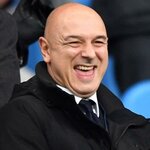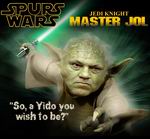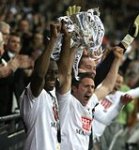Spurs’ January outgoings highlight ‘strange’ business of 2019, but their recruitment issues run deeper
As many loans away from Tottenham Hotspur as Premier League goals for the club — that’s the contribution so far from the four players Spurs signed for more than £100 million in the summer of 2019.
Three of the four players, Tanguy Ndombele (bought for £55 million), Giovani Lo Celso (a loan fee of £13 million then signed for £27 million) and Jack Clarke (£10 million) were granted temporary moves in January, while Ryan Sessegnon (£25 million) spent last season at Hoffenheim and has made only two Premier League starts this campaign. Added to Clarke’s three previous loans (one which saw him head straight back to Leeds United upon signing) it’s a total of seven, matching the quartet’s Premier League goals contribution (six for Ndombele, Lo Celso one).
Whichever way you cut it, that window two and a half years ago was a disaster. The thought even occurs that it was actually worse than the infamous one the previous summer when Spurs didn’t sign a single player.
On closer inspection however it becomes clear that the two are inextricably linked. That the failure of 2019 was in many ways a consequence of not having strengthened the previous summer. It meant Ndombele, Lo Celso and Sessegnon were joining a stagnant group that had not had an injection of fresh blood for so long to give it a new impetus and direction. Instead, they were relied upon to do that, and they weren’t ready to make an immediate impact. And when Mauricio Pochettino was sacked a few months later and replaced by someone opposed to him in Jose Mourinho, the fates of Ndombele and to a lesser extent Lo Celso were pretty much sealed.
With the pair moving on earlier this week, as well as Clarke (to a League One side), it feels like an opportune moment to reflect on what we can learn from what’s increasingly looking like a pivotal moment in Spurs’ recent history. Especially given the way the current head coach repeatedly referred to it in his press conference on Friday.
He used the word “strange” four times in relation to loaning out those three 2019 signings, as well as Bryan Gil, in the window just gone. “It was strange because it means something went wrong in the past, it means maybe in the past, you have to see what you did,” Conte said. “And maybe to understand that there were some mistakes in the past. If you send away players on loan you bought in the last two or three years, it means maybe you did something wrong in the past.”
Spurs certainly did that summer, as they wasted their opportunity to start executing the “painful rebuild” Pochettino had warned needed to happen.
That left them to start that painful rebuild in the week just gone.
Having not bought anyone in the previous two windows, everyone knew Spurs had to act in the summer of 2019. The new stadium was finally built, and while the team had just reached the Champions League final, their domestic form had tailed off badly and it was clear they desperately needed to freshen up the squad. Their declining Premier League points tallies over the previous three seasons — 86, 77, 71 — reflected this.
As Pochettino put it soon after the miracle of Amsterdam: “If we believe that if we operate in the same way that we have in the last five years we are going to be in the Champions League final every season, and we are going to be every season in the top four and competing against projects like Liverpool or Manchester City or Manchester United, I think we are very naive.”
He wasn’t going to tolerate another period of inactivity and after the Champions League final defeat to Liverpool is said to have demanded to chairman Daniel Levy that Ndombele be signed from Lyon in time for pre-season. Perhaps slightly to Pochettino’s surprise, Levy delivered — as Tottenham fended off interest from Real Madrid and Paris Saint-Germain to pull off a statement signing. Ndombele arrived to great fanfare, seen as simultaneously solving their lack of creativity from central midfield but also showing that, after years of austerity as they built the new stadium, Spurs were a major player ready to take the next step. Not since 2013 and Christian Eriksen had Tottenham signed a player that other big clubs were pushing hard for. Ndombele said his aim was to inspire Spurs to go one better than the previous season and win the Champions League the following year.
The now-departed Steve Hitchen, then chief scout but in effect the director of football, and Levy also delivered Pochettino two of his other main targets that summer. Lo Celso was a player Pochettino and his staff admired, and he along with Sessegnon, who Spurs had tried to sign two years earlier, arrived on deadline day. Clarke was one for the future, even if it was not a signing that especially enthused Pochettino.
In any case, Spurs appeared to have finally enjoyed a productive window — a year and a half after they’d last signed a player.
Consider though the environment the new signings walked into. Ndombele, for instance, had joined Tottenham ahead of those significantly more successful clubs primarily to work with Pochettino, hoping to develop his game in the way that so many had under the Argentine at Spurs.
But the team he joined was not the one from a couple of years earlier that he would have imagined. Back then, Tottenham’s players would have done anything for Pochettino, continually pushing themselves to their mental and physical limits.
Now, many were jaded and disillusioned. A significant number felt undervalued and overworked. Christian Eriksen, Toby Alderweireld and Danny Rose were among those who wanted out, looking on enviously at Kyle Walker who had got his move in 2017 and won two Premier League titles in the subsequent two years at Manchester City. Pochettino himself was burned out and in desperate need of a break, with the consensus now that he should have walked after the Champions League final. This was not an easy environment for new signings to walk into.
Re-energising Pochettino and the need to resolve the futures of those players who wanted to leave, which also included the imminently out-of-contract Jan Vertonghen, shows the monumental amount of work Spurs had to do in the summer of 2019. It’s been well documented that failing to move players on in the previous windows was as egregious an error as not signing anyone, but the point is really hammered home when you consider that all these issues were pinching at the same time.
And think for a moment, as Pochettino and his staff often did, about the contrast with Spurs’ Champions League final opponents, Liverpool.
Where Spurs were forced to spend their summer frantically trying to execute a rebuild in a few months that should have been undertaken over a few years, Liverpool could do the recruitment equivalent of putting their feet up. Their summer transfer business amounted to a £3 million outlay on Sepp van den Berg, Harvey Elliott, Adrian and Andy Lonergan and shifting a few unwanted squad players. The serenity translated to success and the Premier League title the following season.
And whereas Jurgen Klopp could return to pre-season training knowing exactly the squad he was going to be working with, there were multiple uncertainties for Pochettino, right up until deadline day. Players arriving at the last minute, as Sessegnon and Lo Celso did, is commonplace for many clubs, but to be unsure of the futures of so many first-team players is extraordinary for a club that had just reached the Champions League final and should have been more in charge of their own destiny. In the end, all of Eriksen, Rose, Alderweireld and Vertonghen stayed and staggered on. All were gone within a couple of years. The uncertainty going into the new season was a recurring theme during the Pochettino years and had been a simmering source of frustration.
As had the rise of Liverpool, whose title win the following season came after they had finished below Spurs in all of Pochettino’s first four campaigns between 2015 and 2018. Their progress relative to Tottenham was a common bugbear for Pochettino and his staff. It rankled that Klopp was presented with Alisson and Virgil van Dijk after the sale of Philippe Coutinho when Liverpool were in a position of strength and just needed to improve a couple of areas. Pochettino either didn’t get those equivalent signings (or sales) or, in the case of 2019, got them when it was too late.
And that sense of being too late is important. For those there, a feeling of inevitability lingers about the way things panned out after the summer of 2019. And that even if Spurs had signed Bruno Fernandes or Paulo Dybala, as they almost did in both cases, the damage had been done. An analogy that has been used is that of needing to replace the dirty water with fresh water in a swimming pool. Spurs had singularly failed to do this, and things had turned stagnant.
And because they hadn’t improved the quality of their squad, by the time of the 2018-19 season Spurs were forced to compensate with greater aggression, commitment and physicality. It was enough to achieve that miraculous Champions League final run but it wasn’t sustainable — as the poor Premier League results in the second half of that season demonstrated.
Ndombele, Lo Celso and Sessegnon would hopefully be an instant fix but the rot was too deep. And Pochettino knew, and said publicly, that his new signings would take a year or two to settle. The problem was that because Spurs hadn’t signed anyone in the previous summer no one was hitting their stride in the 2019-20 season to give the team an injection of something different. The squad was largely new signings who were feeling their way in, and players who’d been there a while and wanted out.
But really what did for the class of 2019 was the sacking of Pochettino a few months after they had arrived. Ndombele and Lo Celso should take plenty of responsibility too, and there must be question marks about why the issues of motivation and maturity surrounding the former were not flagged before he joined. But to varying degrees, the 2019 trio all joined to work with Pochettino and had been signed to fit into his very specialised system. And one only need to look at what has happened to the now-departed Dele Alli since Pochettino’s own exit to appreciate how massive a difference he can make for individual players.
Instead, Pochettino was replaced by Mourinho, who initially marginalised Ndombele and loaned out Sessegnon at the end of his first season. Lo Celso did excel for a brief period under Mourinho but he couldn’t sustain the good form and, while Ndombele worked his way into the team, it was never a particularly healthy relationship. Some of those close to the situation don’t blame Mourinho or Ndombele as such for how things panned out, but see it more as a partnership that was always extremely unlikely to work.
Which links back to why Pochettino’s departure is seen as the most important factor in the failure of the individuals who were signed in that 2019 summer window to thrive. That they were collateral damage of a lurch from one style of play to a completely different one. The process could be seen as being akin to building a house with one set of materials, and then switching halfway and using a different set entirely.
The failure of that window should act as a cautionary tale to the club now — that ripping up the plan that was working well and replacing it with something entirely different is a risky business, that players should be signed to work in a system not entirely dependent on who the manager is, unless you pledge to back that manager for the long term. The return to a director of football/head coach model may help in this regard, but it also helps if the head coaches that are appointed are at least reasonably similar in their outlook.
But really, the lesson is that no window can be wasted, that the evolution of a team should be an ongoing process, and that consistent mistakes can rarely be remedied in one window. There’s also a false economy in resisting making big signings and then doing so when the opportunity has passed and the potential rewards are far less. That window of 2019 is a reminder that Spurs have spent a decent amount of money in the last few years — they just haven’t always spent it well.
Hopefully, all of these lessons are being learnt — certainly, Conte is acutely aware of previous failings. “Usually you buy players to reinforce your team, you don’t lose players after one, two or three years,” he said on Friday in a clear message to the Tottenham hierarchy. “For this reason, we have to pay more attention in the future when we go into the market to sign players.” Conte also suggested that Spurs need to consider more whether prospective new purchases will be a good fit for the Premier League.
It should be said as well that sometimes signings just don’t work out. Returning to Liverpool, there have been plenty of hits but also signings like Naby Keita who is clearly talented but for whatever reason hasn’t delivered what was expected of him. Gabriel Jesus at Manchester City is another you could put that in category.
It also helps if you’re a club like City or Chelsea where signing £50 million players is so commonplace you can afford a few misses. The latter for instance spent just under £50 million on Timo Werner in the summer of 2020 and when that didn’t work out brought in Romelu Lukaku for £97.5 million the following summer.
But when you’re Tottenham and spending that kind of money on individual players is so rare, you can’t afford to make those kinds of mistakes. Hence the regret surrounding that 2019 summer window.
It wasn’t just about that window, though. It’s apparent now that the mistake of the summer of 2019 was as much about the players that were signed as it was not giving them anything like the best chance to succeed.








